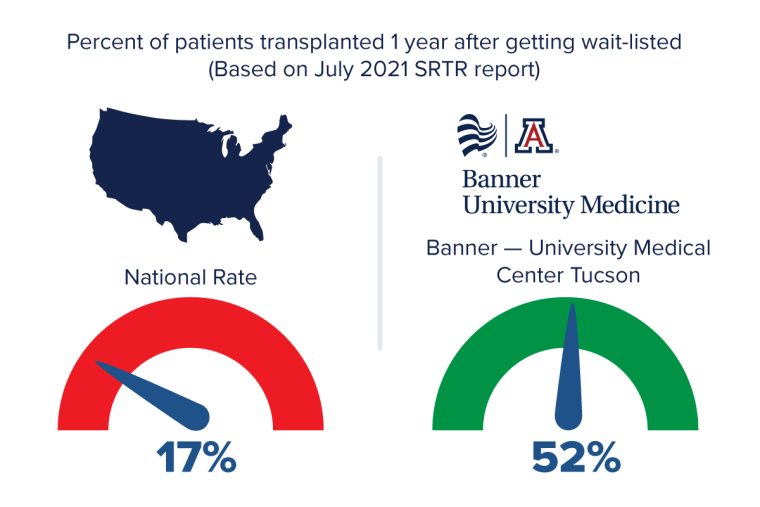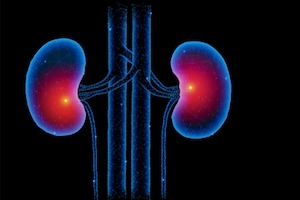The University of Arizona Kidney Transplant Program is one of the leading academic transplant programs in the Southwest. We are devoted to the treatment of patients with end-stage renal disease whether they are on dialysis or approaching the need of dialysis.
Our multidisciplinary team includes transplant surgeons, adult and pediatric transplant nephrologists, transplant pathologists, transplant physician assistants, pharmacists, social workers, transplant coordinators, dietitians, and tissue typing specialists.
- Our Kidney transplant program has been recognized nationally for a very high transplant rate and low waiting times on the kidney transplant waitlist.
- When waitlisted in our program, 1 out of 2 waitlisted patients are transplanted within one year (compared to only 1 in 6 across the U.S.). This means that patients listed in the Banner — University Medical Center Tucson kidney transplant program are likely to get transplant 3 times faster compared to other programs.
Image
- Our active and growing living donor kidney transplant program will further enhance our ability to transplant our patients even faster than any center in the US.
- We offer kidney transplants from Hepatitis C infected donors to Hepatitis not infected recipients as well, given the fact that we can cure hepatitis C with the new medications in 6 weeks of treatment after transplant.
Select Areas of Additional Expertise
- Diabetes management via combined kidney-pancreas or kidney-islet transplants
- Robot-assisted/minimally invasive procurement of living-donor kidneys
- Transplants in patients with positive crossmatches
- ABO-incompatible living-donor kidney transplants (for recipients and donors with incompatible blood types)
- Nondirected ("Good Samaritan") living donor transplants
- Multiorgan transplants (e.g., pancreas-kidney, liver-kidney, heart-kidney, lung-kidney)
- Kidney transplants for HIV+, HBV+, and HCV+ patients
Make an Appointment: (520) 694-0432
Living Donor Kidney Transplantation
The Department of Surgery at the University of Arizona is proud of its living donor kidney transplant program. A living donor kidney transplant is perhaps the best type kidney transplant we can offer our patients with kidney disease, and living donors can help close a significant gap in the need for kidney transplants.

In 2020, 4,730 patients died while waiting for a kidney transplant due to a shortage of available deceased donors, according to the Organ Procurement and Transplantation Network. Living donors can help fill that need and save many lives. A kidney transplant can come from a living donor because only one kidney is needed for a normal adult to sustain a healthy life.
There are many benefits to receiving a kidney from a living donor:
- Living donor kidneys last longer compared to deceased donor kidneys, on average.
- The waiting time for living donor kidney transplants is short, and some patients may be able to avoid dialysis completely if they have a living donor.
- Living donor kidneys usually work immediately.
- Living donor kidneys may be more resistant to rejection than deceased donor kidneys.
How to Become a Donor
Please call (520) 694-6241 to start the process.
The pre-donation evaluation starts with a phone conversation and health history questionnaire. Further evaluation consists of blood, urine and imagine tests, meeting our doctors and our multidisciplinary team. All aspects of donor evaluation and the donation surgery are covered under the recipient’s insurance. Donors have the option to stop the evaluation process at any time, and the reason will be kept confidential.
Matching donor and recipient:
Blood tests will determine the blood and tissue type of recipient and donor to determine if there is a match between them. Even if the blood or tissue types do not match, the donor–recipient pair can enter a paired exchange. A paired exchange means two incompatible living donor-recipient pairs swap donors. Each recipient still gets a living donor kidney, even though their original donor was incompatible with them.
Additional resources:
- Additional information about living donation from our governing body, the United Network of Organ Sharing.
- Having Your Donor Find You: A website that educates recipients on raising awareness about their need for transplant and assists them in finding a living donor.
- The National Living Donor Assistance Program helps donors relieve financial barriers to donation.

